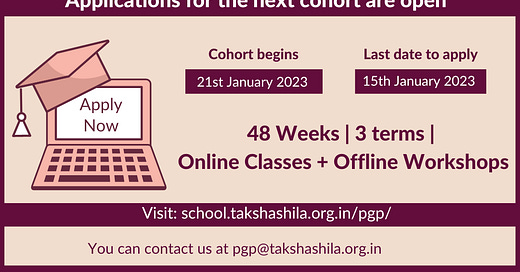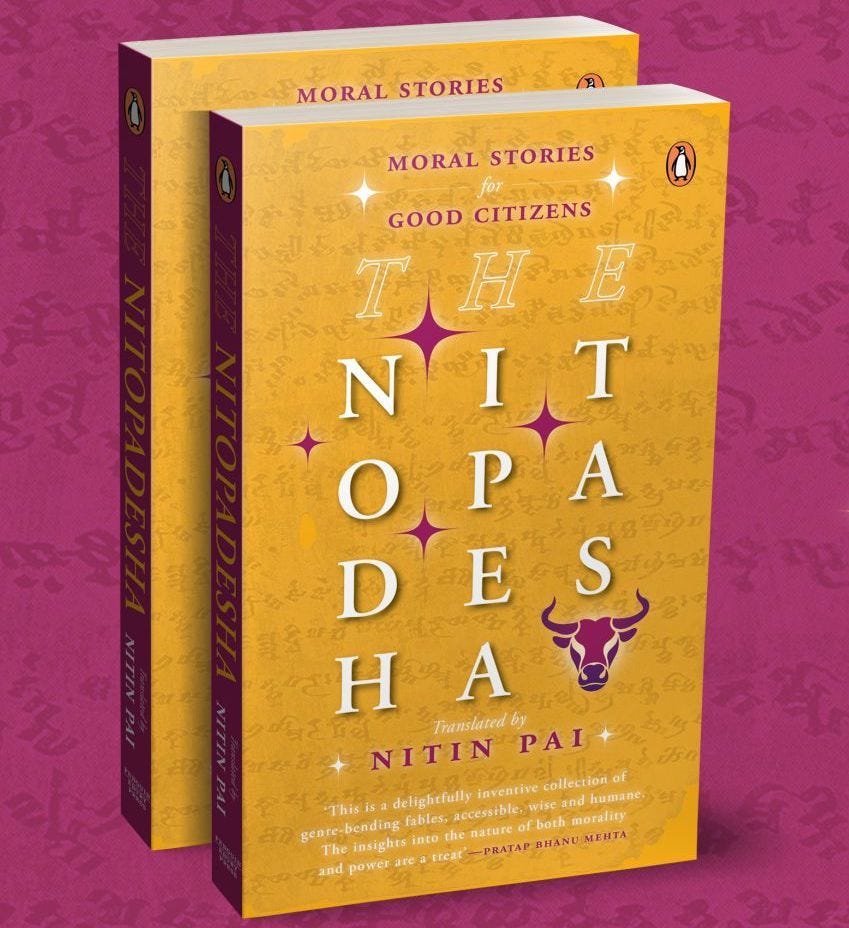20 Million Jobs & Generating Access to Credit
Dear Reader,
Hope you are doing well. In this edition, we bring to you our latest on the role of access to credit in creating 20 million jobs for India, how the Indian Army must tread the lines in the context of political calls for Akhand Bharat, the invisible emergency of suicides in India, new e-commerce customer review norms and more.
We are also delighted to share with you two new book announcements by Nitin Pai and Pranay Kotasthane, respectively. Both books are slated for release early next year.
20 Million Jobs & Generating Access to Credit
India needs to create 20 million jobs annually. Access to credit can support firms in their growth, thereby producing more jobs for individuals. Our latest research output ‘Generating Access to Credit’ by Aarushi Kataria & Sridhar Krishna, looks at the impact that access to credit has on growth, productivity, and consequently, employment for the MSME sector. Designing access to credit policies requires enabling the availability of credit and ensuring the terms of the credit are favourable to the targeted population.
Among others, they offer the following recommendations:
Ease compliance burden & improve digital infrastructure to help fintech companies thrive in the lending space, thereby improving access to credit for MSMEs.
Government schemes and entities for providing credit exclusively to MSMEs in India.
MSMEs should capitalise on emerging sources of credit including asset-based financing, alternative debts, equity & hybrid instruments.
Takshashila’s Sridhar Krishna also spoke at the second edition of the CII Global Economic Policy Summit in New Delhi, on the theme ‘Economic Policy for a Future Ready Economy’. He emphasised the role of financial institutions in helping the youth of the country to undertake skill enhancement and meet their goals of financial and economic progress.
Listen to his remarks here:
Nitopadesha by Nitin Pai is Available for Pre-Orders
Nitin Pai, Director, Takshashila Institution has a new book coming out early next year!
Read in his own words, what the book is all about:
Not many people know that the Panchatantra and the Hitopadesha, like the Arthashastra, primarily dispense advice to princes & kings on how to acquire power and rule wisely. Their lessons of amoral statecraft are misleading when applied to citizens.
The Nitopadesha is different. It is a book of citizen-craft, offering guidance on how free citizens can shape their civic and political communities to attain yogakshema. A unique blend of fables and stories that covers politics, economics and philosophy.
Click here to read the amazing story of how the manuscript for Nitopadesha came into Nitin’s hands!
Also, Pranay Kotasthane, Deputy Director of Takshashila Institution too has a new book - Missing in Action: Why You Should Care About Public Policy co-authored with Raghu S. Jaitley - coming out next year. We will let you know as soon as these are available for order!


Akhand Bharat & Indian Army
In his weekly column for The Print, Lt. Gen. Prakash Menon writes on how misplaced military threats by India often benefits Pakistan’s Army:
Whenever India’s political or military leaders brandish threats during periods that could be described as ‘uneasy peace’, Pakistan Army becomes the main beneficiary. This is because such military threats strengthen their institutional grip on national security policies and provide oxygen for their power base in national politics. Strategically, India is disadvantaged as it reinforces the Pakistan Army institutionally and further reduces chances for improving relations. For the Indian political leadership, threatening Pakistan may be useful for electoral gains. But the cost is often paid through damage to national interests.
Rajnath Singh’s assertions of “taking back PoK” and “Partition on religious lines was a historic mistake” could be drawing their ideological sustenance from the notion of Akhand Bharat. On the other hand, military leaders could be viewing the PoK matter through the prism of recovering disputed territory that Pakistan has illegally occupied. But when they echo the Defence Minister, military leaders are susceptible to being seen as party to an ideological concept based on a Hindu superiority construct, which runs afoul of India’s constitutional values.
India's Invisible Emergency – Suicide
India has the highest number of suicides in the world and the rate of suicides per one million population has gone up in the last 4 years. In an opinion for the New Indian Express, Sachin Kalbag writes on India’s new National Strategy to Prevent Suicides:
According to the MOHFW, bio-psychosocial factors (psychiatric illness, substance abuse, family history of abuse or suicide), Environmental factors (job loss, relationships, exam failure, domestic violence, child abuse, etc) and sociocultural factors (stigma surrounding mental health, healthcare access barriers, religious or cultural beliefs, media coverage of suicide) are the main umbrella factors, but each of them is so diverse in its roots and impact that, without an intersectoral approach, success will always elude us.
Therefore, the implementation matrix developed by the suicide prevention technical committee will be key, and even if each aspect has been provided with a stakeholder, a strategy, indicators, action points and a time frame, the most significant part will how each state actions it, regardless of the target.
Also, listen in to today’s All Things Policy episode where Sachin discusses the suicide emergency with Shrikrishna Upadhyaya:
New E-Commerce Customer Review Norms
Mihir Mahajan, Adjunct Fellow with Takshashila, appeared on The Hindu’s In Focus podcast to discuss the Union Government’s new norms that e-commerce websites must adhere to for customer reviews. Tune in to learn more about the standards set by the government, whether they are mandatory or not and if the government ought to have done more:
Takshashila Alumni Meet-ups at Delhi and Pune
Here are some glimpses from our alumni meet-ups at Delhi and Pune last week:
For information regarding more such alumni events in the future, stay tuned at Kalpa.
Applications for PGP Programme are Open
The Post-Graduate Programme in Public Policy (PGP Programme) is a 48-week multi-disciplinary, specialised programme, designed for students who wish to gain a deeper understanding of the theoretical and empirical approaches to public policy. The curriculum includes courses on constitutional structure, software of public administration, ethical reasoning, political economy, international relations & foreign affairs, economics, and quantitative analysis in public policy. The students will also be required to undertake a Capstone project in their interest area.
The PGP Programme is suitable for working professionals who are in the public policy space or are looking to explore a career in public policy while pursuing current occupations. Prior work experience of 2 years is a desirable criterion for admission. The PGP programme will equip students with the necessary skills of policymaking, analysis, persuasion and communication in their desired career choice.
That’s all from us this week. Take care!








